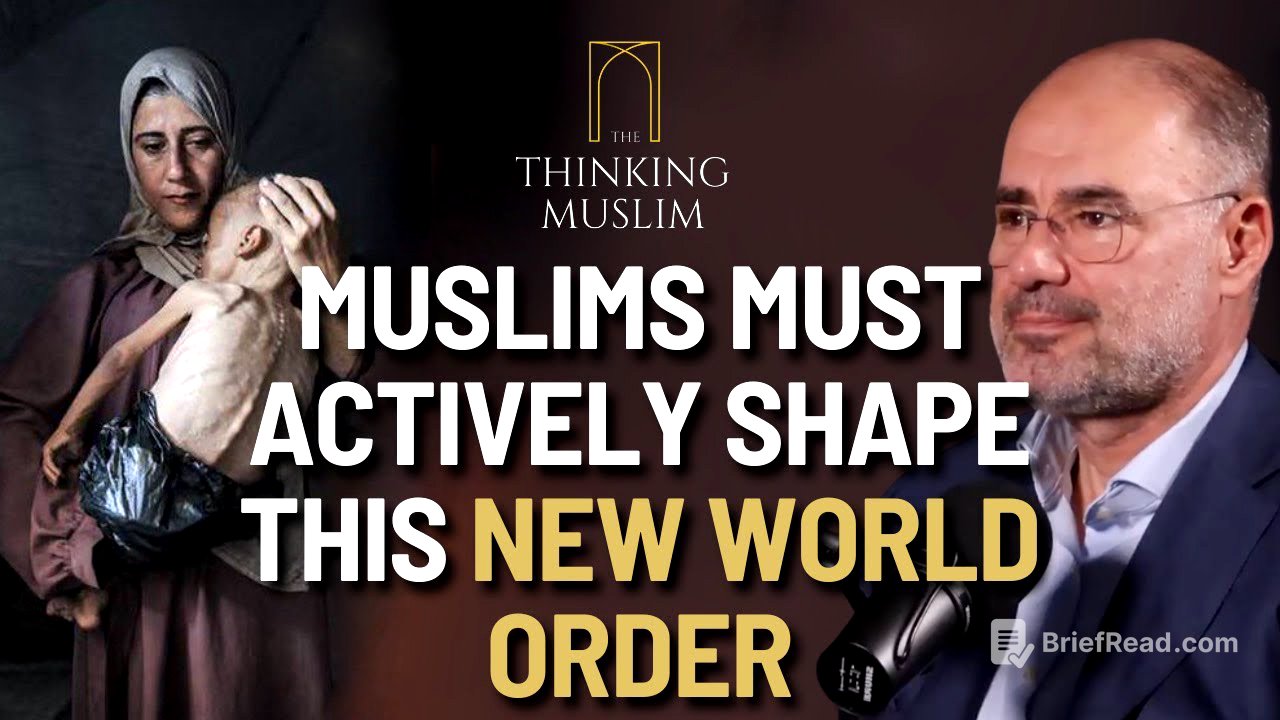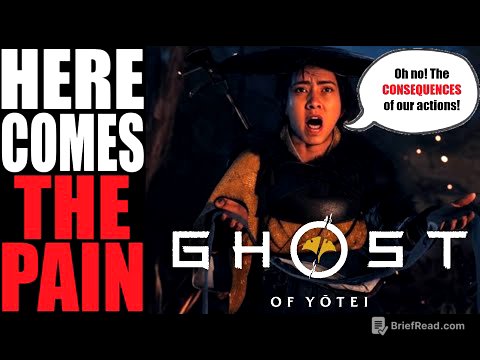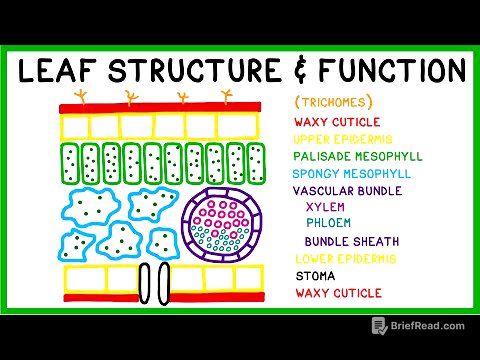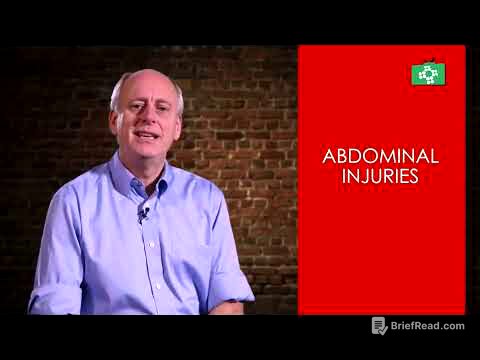TLDR;
This video features an interview with Wad Khan, who discusses the current state of the world order, arguing that we are witnessing the decline of a Western-centric civilization and the international system it created. He suggests that Muslims need to actively participate in shaping the new global order.
- The current global structure perpetuates existing problems, but integration offers an alternative.
- The concept of "Ummah" is a geopolitical association tied to power, not just a spiritual connection.
- The current period is unique due to the absence of the "Ummah" as a concept of geopolitical power.
- Western Muslims should form alliances based on shared values to influence the global debate.
Introduction [0:00]
The host introduces Wad Khan, highlighting his recognition as a top global thinker. The conversation aims to build upon previous discussions about the emerging world order, particularly in light of the Trump presidency and events post-October 7th. The discussion will explore the end of US globalism, the impact of Gaza, and Muslim world autonomy.
Islam and international politics [3:30]
Wad Khan argues that the 23 years of the Prophet Muhammad's mission led to the biggest geopolitical shift in history by ending the 700-year bipolar world order between the Persians and the Romans. This bipolar system was ending because both empires were losing their moral standards, values, and principles, leading to a civilizational cycle's end and the demise of the world order. Allah's message to the Prophet in Mecca, predicting the Romans' victory over the Persians, was a strategic guidance to prepare for a new world order. This prompted the Prophet to establish a center of power in Medina and project power against the victorious Romans to inherit the new order.
Donate to Baitulmaal [11:20]
This section is a call to donate to Baitulmaal, an organization providing humanitarian aid to Afghan refugees facing hardship and deportation.
Allah’s message [12:07]
Wad argues that Allah's message to Prophet Muhammad was to prepare a power base to exploit the changing world order, rather than just reacting to persecution. The Prophet strategically built foundations for a polity in Medina to fill the vacuum that would emerge after Mecca's conquest. He targeted Quraysh's trade routes and alliances, establishing Medina as a center of power. The Treaty of Hudaybiyah was a maneuver to make Quraysh aware of this new power. The source of this strategy was from Quran.
Ummah geopolitical? [19:11]
Wad explains that the concept of "Ummah" first appeared in the Charter of Medina, describing the entity created by the Prophet as an alliance between Muslims and non-Muslims. The "Ummah" became the DNA of that political entity, representing a sphere of influence and power guided by Islam, regardless of its citizens' religious affiliations. The concept of nation-state is alien, and the concept of ummah is original. The loss of direction started when the concept of nation-state was sent, replacing 13 centuries of consensus.
Impact of Ummah [24:05]
Living in an "Ummah" architecture means citizenship is tied to the meta-entity, not the specific kingdom or emirate one is born in. Historically, individuals were treated as citizens of the broader "Ummah," allowing freedom and mobility across different political entities. This liberated individuals from the hegemony of the state, fostering a sense of belonging to a larger umbrella.
Ummah’s history [27:50]
Wad argues that the current period is different from past crises in Islamic history because the "Ummah" as a concept of geopolitical power is missing. In the past, the "Ummah" created a sense of urgency and unity against invaders. Today, fragmentation and the prioritization of individual state interests have eroded collective security. The current structure inherited from the French and British after World War I has failed, leading to civil wars, sectarianism, and weakness.
Ummah lacking geopolitical power? [33:08]
The reason why this period is different to all of those bleak periods in Islamic history, is that the ummah as a concept of power, as a concept of geopolitical power is missing within our mindset. Attempts to establish collective entities like the Arab League and the Organization of Islamic Cooperation have failed due to the prioritization of individual state interests over collective security.
Trump accelerating world order? [34:53]
Wad compares the current system to the time of Prophet Muhammad, arguing that we are experiencing the end of both a civilizational cycle and a world order. The Western civilization, driven by Protestant culture and Renaissance ideals, is giving up its core values of religious and spiritual concepts, international law, justice, and equality. The rise of China, an ancient power reclaiming its position, challenges the American-led world order. America's desperate measures to maintain its position, such as pressuring allies and provoking China, are destabilizing the world.
Trump manifestation of collapse? [45:02]
Wad argues that Donald Trump is not the cause of the collapse but a manifestation of it. The deterioration of political strategies and leadership in the West, coupled with the rise of nationalism and xenophobia, indicates a civilizational decline. The current war against Russia is seen as a misjudgment, and the civilizational cycle will continue to produce crises, not solutions.
MAGA [47:30]
Wad explains that the "Make America Great Again" movement reflects a tendency in America to resolve from the world. Despite the tension between globalists and America Firsters, the underlying goal is to contain China and sustain American presence. Trump's approach is a populist manifestation of this strategy, similar to how Netanyahu is manifesting the essence of the apartheid state of Israel.
War between China and US [51:45]
Wad suggests that China does not want war and is not imperialistic. However, America's attempts to interrupt China's trade routes and dangerous game on Taiwan could lead to confrontation. America's military actions and alliances in the region are provoking China, and the possibility of war depends on various factors, including misjudgment or overreaction.
Israel [57:46]
Wad argues that Israel's strategy of re-engineering the Middle East is mistaken because it offers partition, civil wars, and weakening of the region. Israel's existential fear leads it to seek dominance and fragmentation in the region, maintaining a monopoly on nuclear power. Israel is turning itself into an enemy of individual states in the region, triggering a reaction against its hegemony.
How to prepare for power? [1:03:30]
To prepare for power, Wad suggests following the Prophet Muhammad's example by having a clarity of vision, establishing strategic direction, and imagining the future. The Islamic world should start thinking of aggregating power instead of partition, working together like the European Union or ASEAN. This involves cooperation on economic, infrastructure, and human interaction levels.
Elites [1:10:22]
Wad argues that the future should not be entrusted to the current political elite, who are entrenched in divisions and follow a policy of conflict and fragmentation. Instead, forces of society like intellectuals, civil society groups, and active community members should imagine the future and put ideas forward. A moment will come when a new alternative is needed, and being ready with a concept is important.
Substate actors [1:15:17]
Wad suggests that intellectual discussions should challenge the concept of separation created by nation-states. Economists, educationalists, and professional unions should communicate and establish a virtual "Ummah."
Virtual Ummah [1:18:40]
The virtual "Ummah" is an open space where individuals interact and are aware of their national interests. Professionals, doctors, engineers, students, scholars, and scientists can establish layers of cooperation. This elevates identity from narrow nationalism to a wider network, empowering the "Ummah."
Gaza changed Ummah? [1:23:55]
Wad believes that Gaza will be seen as a moment of transformation for the Islamic world. The West does not understand the Islamic world's collective, history, and spirituality. The West mistakes silence for acceptance and fails to understand the historical meaning of events.
Western Muslims role [1:28:11]
Wad suggests that Western Muslims should embrace alliances and extend their hand to everyone who defends shared values of justice, equality, and environment. Muslims need to share their values in the global debate and become part of alliances to correct the current crisis. Muslims should elevate their principles of faith into a global human interest, inspired by their religion but addressing everyone.









